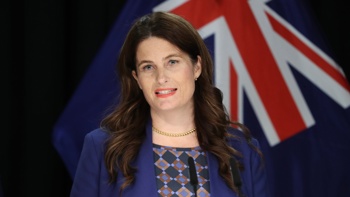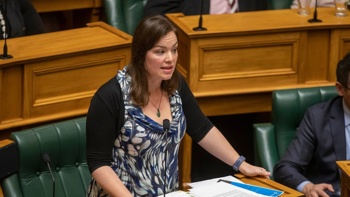
The Solicitor-General has today appealed for a harsher prison term for an Auckland mum who forced her teen daughter to work as a sex slave, selling her at least 1000 times to men around the city.
In March Kasmeer Lata, 36, was jailed for six years and 11 months for dealing in slaves, dealing in a person under 18 for sexual exploitation, and receiving earnings from commercial sexual services from an underage person.
Justice Matthew Muir also imposed a minimum period of imprisonment of three years and five months.
Lata, 36, had first forced her daughter to have sex for money with a man on her 15th birthday.
She would go on to sell the girl at least 1000 times for sex.
The victim later spoke exclusively to the Herald about her ordeal, and how she felt to be free from her mother's offending and a life of fear and misery.
The maximum sentence for dealing in slaves under New Zealand laws is 14 years' imprisonment.
At Lata's sentencing - where she was described as "the most despised woman in New Zealand" - Crown Prosecutor Natalie Walker called for the offending to be denounced in the most explicit terms.
Justice Muir said Lata's offending caused "long-lasting, if not irreparable damage to her daughter" as she "effectively pimped her out".
"New Zealand's courts will not [tolerate] the prostitution of children," he said.
"Children are entitled to the love and care of their parents - not to be farmed out for financial gain."
However his sentence was soon appealed by the Solicitor-General, who wants Lata to do more time behind bars to reflect the severity of her offending.
The appeal was heard in Auckland today by Justice Brendan Brown, Justice Patricia Courtney and Justice Sarah Katz.
The appeal was heard in Auckland today by Justice Brendan Brown, Justice Patricia Courtney and Justice Sarah Katz.
Deputy Solicitor General Brendan Horsley said the sentence handed down did not reflect the seriousness of Lata's offending and Justice Muir was, effectively, too lenient.
He said Justice Muir set a starting point that was too low, which meant the end sentence was not adequate.
"This is a case that went, to say off the rails would be overstated, but departed from best practice and from the Sentencing Act," Horsley submitted.
He said Justice Muir started his sentencing on the basis that he was "obliged to impose the least restrictive outcome appropriate in the circumstances".
"With great respect that's in fact not an appropriate way to start this particular sentencing exercise," said Horsley.
Justice Muir's starting point was 9 years and 6 months in prison.
Lata was then given discounts for factors including her guilty plea, which spared the victim going through a trial.
However Horsley said that starting point should have been set at at least 12 years, which would have meant a longer end sentence for Lata.
He said a sentence closer to the maximum penalty available should have been imposed to reflect Lata's offending, which he said was "some of the most serious offending of its kind".
"This was a case where it's probably fair to say all parties involved accepted that this was offending either near to or at the most serious of it's kind for the particular offences," Horsley said.
"At the very least you can say this was near the most serious of cases ... That is the bottom line that the Solicitor General maintains in this case.
Horsley said Justice Muir also erred in giving discount for a lack of violence.
While there was no physical violence, Horsley said what Lata did to her daughter was "more insidious".
She "coerced" her into sexual activity, telling her if she did not make money her younger brothers would not get food.
"She tried to withdraw and was charged for rent, internet ... this was a 15-year-old child with no other means of income," Horsley said.
He said the victim was in New Zealand unlawfully and had "no ability to go to the authorities" for help.
Lata "deliberately isolated" the girl, keeping her out of school, so she could work as a prostitute and earn more than $100,000 in 18 months - most of which was handed over to her mother.
Lata's lawyer Karl Trotter said while he agreed the offending was among the most serious, the sentence handed down by Justice Muir was appropriate.
He said Justice Muir reviewed the facts before coming to his starting points.
He submitted that there was far worse offending than Lata's and Horsley was "short of the mark" in his appeal grounds.
"This offending, bad as it is, is a distance away from the most serious of its type," said Trotter.
"(Justice Muir) took into account everything he should have.
"My submission is that he delivered a sentence that was adequate and falls short of a mark that is manifestly inadequate."
The appeal decision has been reserved.
Lata's partner Avneensh Sehgal was also jailed for his part in the sexual offending.
He was sentenced to four years and eight months' imprisonment with a minimum period of two years and four months.
Before Lata, only two others had been convicted over dealing in slaves under New Zealand legislation - the first in 1991 and another in 1998.
Both Lata and Sehgal will be deported to Fiji and India, respectively, at the conclusion of their sentences.
The teenage victim, now 18, was granted residency and can now live, work and study in New Zealand without fear of deportation.
During the offending, she was forced to pay rent and bills with the money she earned from selling her body.
She discovered she was pregnant in mid-2015 but was told by her mother to keep working so she made money to pay for an abortion, which she later had.
"I had to do what I was told, what my mother said," the teenage victim told the Herald.
"I didn't want to ... I felt vulnerable, I didn't know what to do.
"I was scared.
"I knew what was happening, but I didn't know why.
"I was worried that if I kept doing it no one would want to marry me - no one wants to marry a woman who has slept with hundreds of men."
SEXUAL HARM - DO YOU NEED HELP?
If it's an emergency and you feel that you or someone else is at risk, call 111.
If you've ever experienced sexual assault or abuse and need to talk to someone call the Sate to Talk confidential crisis helpline on: 0800 227 233 (08002B SAFE).
Alternatively contact your local police station - click here for a list.
If you have been abused, remember it's not your fault.
Take your Radio, Podcasts and Music with you









